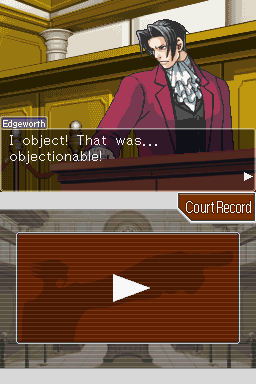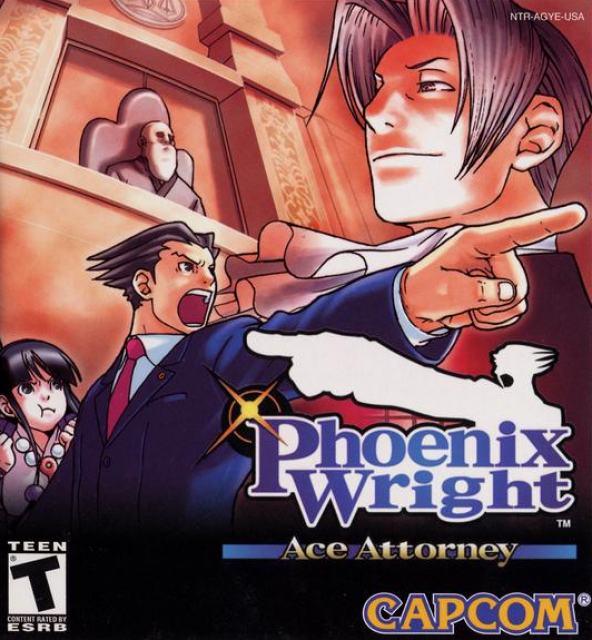A Sense of Justice
Legal dramas aren’t generally a genre you’d associate with video games, but as a form of fiction they might have more to offer the medium than you’d think. They provide the same chances for character exploration, relationships, and conflict that you find in other dramas, but here there’s also the mystery of trying to put the clues of a case together, the tension when it looks like the case can’t be won, a feeling of vicarious intellectual empowerment as we see characters work the mystery out and turn things around, and a sense of justice and victory when the truth is revealed. This makes them prime material for video game adaptation, as the mystery of solving the case can become the puzzles we solve in the game, and instead of simply watching another person outsmart everyone and deduce the truth in a case, we can get to do it ourselves.

This is what Capcom tapped into when they released a legal drama adventure game in 2001 for the Gameboy Advance entitled Gyakuten Saiban or Turnabout Trial, but this game didn’t see publication outside of Japan. After the release of the Nintendo DS in late 2004 however things changed. Capcom began development on a port of the game for the DS which included new content and support for touch and voice controls. The result was Gyakuten Saiban Yomigaeru Gyakuten (roughly Turnabout Trial: Turnabout Rebirth), or as it was called in the west Phoenix Wright: Ace Attorney. This version actually saw release outside Japan, hitting North America in 2005, Europe in 2006, and Australia in 2009, becoming one of the best acclaimed third-party titles for the DS.
The game follows the eponymous hero Phoenix Wright, a fresh and driven new defense attorney ready to do whatever it takes to win a case. However, Phoenix’s career gets off to an unenviable start when he finds his own boss Mia Fey murdered in her office and her younger sister Maya becomes the prime suspect, making Phoenix’s first case alone a quest to find the person who killed his mentor and clear an innocent girl of murder charges. The game’s cases consist of two different types of sections, those in which you’re looking for clues, and those in which you’re appearing in court. The former take the form of more typical adventure game challenges and exploration: You move around various 2D environments examining them to find clues, run through conversations trees to get to know characters and obtain information on the case, and occasionally present characters with relevant items from your inventory or “Court Record” to tease more vital leads from them. The court sections are a little more unconventional however.
Courtroom scenes largely hinge around witness testimonies, lengths of text which you can flip through bit by bit using the left and right arrows on the touch screen. Witnesses can be pressed on any one section of their recounting of events to make them elaborate further. The aim of these cross-examinations is to find contradictions either within the witness’s testimony or between their testimony and what’s already been ascertained about the case. When you think you’ve found one of these contradictions you must produce an item from your Court Record to prove that their testimony is faulty. For example, if a witness is recalling their memory of a murder and they say they remember three shots being fired into the victim, you might be able to prove them wrong by finding the gun in the Court Record which was previously noted to have only been fired twice and presenting it to the court. Presenting irrelevant evidence isn’t without consequence though. Do it five times in one court session and you lose the case.

Your time in the courtroom really is the best part of the game. Many adventure games are full of puzzles with specific elements and obvious prompts which make them feel contrived and unrealistic, but the courtroom setting of Phoenix Wright makes solving its various puzzles feel like an organic and natural experience, and only makes it feel like it’s all the more the result of your intelligence when you’re able to make a breakthrough. There’s nothing like presenting those vital pieces of evidence which shatter a witness’s false testimony or a prosecuting attorney’s bad reasoning. The music cuts out, Wright shouts his “Objection”, and the game’s affirming “deduction” theme starts playing as Wright explains the essential detail that everyone missed but you. It makes you feel quite simply like an intellectual badass. Even the individual animations in the trials are gratifying, from the way Phoenix slams his hands down on the desk when he has a point to make, to the way that prosecuting attorney Miles Edgeworth derisively waves his finger when putting down a part of your defense. Ace Attorney’s other great strength is in its characters and story.
The aforementioned Maya Fey comes to act as Phoenix’s sidekick and the two make a strong team, both upbeat and enthusiastic, but with Maya possessing a little more charming naivety, while Phoenix grounds things by being slightly more down to Earth. Frequently this comes off as well as it does because in their cases the two encounter a variety of eccentric personalities and unusual events, often setting Wright up for one of his amusingly sarcastic pieces of internal monologuing, while Maya is more likely to get lost in a world of her own during investigations. The recurring side characters are also indisputably fun to be around. There’s the authoritative but frequently oblivious Judge, the slightly bumbling but lovably headstrong Detective Gumshoe, and then there’s Miles Edgeworth who’s frequently cold and aloof, but inspires a certain kind of quiet respect. As you’d expect from this type of story the court cases serve as a practical means to discover more about these and other characters. As people’s motives and actions are put in plain view of the public as part of the trials, you often learn what drives them, what they’re like behind the image of themselves they present to the world, and what events from the past shaped who they are today. The way that the narrative slots neatly into the gameplay here aids the developers in bringing out some depth and layering to the characters, even when they haven’t been around for a particularly long period of time.
The game as a whole walks a line between the realistic and the cartoonish in a way I’ve never quite seen courtroom fiction do before. There are light-hearted stories in this genre, but few books or films go quite as outlandish with their characters and events as Phoenix Wright does, and it’s refreshing. It also complements well what the game is trying to be. Because players can’t be bogged down with all the technicalities and protocols of real legal cases, having a somewhat off-the-wall and comedic universe means that the court cases can be more simplified and goofy. In addition, this tendency towards the humourous makes the game’s more human moments hit deeper. When all the silliness is put aside, the characters often reveal something touching about themselves as people and show there’s more to them and their histories than may first meet the eye. The game is quite skilled at choosing its moments to dive a little deeper into character emotions and when most of the cast is so chipper and amiable, it can be genuinely moving when they let down their guard and show you their vulnerabilities. You grow to like the characters both because of their immediate and often endearing outward demeanours and from knowing a little more about what life has been like for them and how they’ve dealt with that.

Phoenix Wright certainly isn’t without its weaknesses though. When things are going well the game is a joy to play, but when they’re going not so well, the game can become a bit of a slog. The faults which plague Phoenix Wright are often the same ones which plague many other adventure games. For example, progress when looking for clues sometimes requiring triggering specific events when it’s not clear or even particularly logical where you have to go and what you have to do to trigger them. When you’re searching for clues and get just plain stuck for what to do next, there’s also little to stop the game from devolving into boring, methodical “Try poking everything” or “Try showing everyone every piece of evidence” type gameplay. Whether you know what you’re doing or not, the game’s navigation can also get in the way. You can often only reach certain specific areas from certain other areas, which gives some sense of the layout of the world, but can leave you arbitrarily clicking through a bunch of menu options to get where you need to be.
More tiresome, the game frequently finds ways to repeat text you’ve already read. This is somewhat alleviated by it helpfully putting ticks next to the conversation options you’ve already run through, but the same does not apply for items you’ve already shown the person you’re talking to. Characters will also generally spew the same stock response every single time you present them an item which they cannot or will not comment on. More of this text regurgitation happens during the court cases, as it’s sometimes hard to remember which bit of text you pressed a witness on to get a certain speech out of them, so you can easily end up pressing the same statement only to find you’ve consumed that block of dialogue before. Additionally, when you reach the end of a witness’s testimony, before you can start examining it from the beginning again, you’ll have to scroll through a whole speech specific to that testimony every time.
Just now and then you’ll encounter another problem in trials in which you have a piece of evidence which logically shows a contradiction in the witness’s statements, but because the game has only scripted one specific piece of evidence to work or because it wants you to present it at a deceptively specific point in the proceedings, you’ll be punished for trying to show that you’ve already worked out what’s wrong with what the witness is saying. Should you actually lose a court case, you’re in for one of the more upsetting scenarios an adventure game can dole out, as you are set back to your last save point and have to trudge back through all the cross-examinations you’ve already solved and dialogue you’ve already read. Not only is there no engagement to be found in rehashing these sections immediately after you’ve played them, but it’s also a little nonsensical of the game to increase or reduce your punishment based on how regularly you save, especially when the game makes saving a little inconvenient. You are prompted to save at specific points in the story, or can save at any time but be chucked out to the main menu. I can’t help thinking that since this game was published in 2005 a “Save and Continue” option wouldn’t have been too much to ask, especially as it was released on a handheld console where accidental shut-offs and batteries running dry are from time to time a reality.

Outside of those shortcomings, most of the chinks in the game’s armour are to do with the specifics of what it is. As a defense attorney Wright faces the moral quandary that the people he is defending may not always be innocent, and this is brought up in a pretty serious way on more than one occasion, but the game drags this fact out into the open without truly dealing with it. Every time it comes up, Wright just believes in his client and one way or another everything works out. His heroism and trust is uplifting, but this issue is left hovering in the background as an ugly loose end which the game fails to properly resolve and conflicts with some of Wright’s ideas about truth and justice. You can also tell very clearly where the additional content has been added to the game in its port to the DS. Without spoiling too much, the new content is perfectly enjoyable within itself, even using the DS’s unique features in some interesting and cool ways, but it flows completely against the pacing and build-up of the game, and to keep the same character dynamics the writers bring in a new character who doesn’t feel entirely original to replace an old temporarily indisposed one, although in all fairness this character is likeable and has an interesting backstory.
Everything laid bare, Phoenix Wright: Ace Attorney is a game in which plodding through dialogue you’ve already read is a frequent occurrence, losing is something handled very questionably, you regularly bump up against some video gamey edges, and additional content feels tacked-on. None of this however can truly eclipse what the game gets right. There’s an unmistakable thrill in being the underdog, able to outsmart the prosecution and bring justice even when the odds are stacked against you, and the game’s events are filtered through a cast which are able to inspire empathy, amusement, and general glee. With an aptitude for bringing smiles to the faces of regular gamers and casual players alike, it’s hard not to recommend Phoenix Wright, even with if you are likely to hit a few hitches in your time with it.

3 Comments